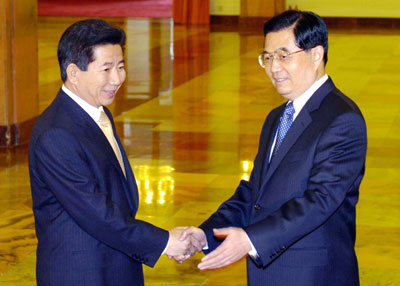ROK president concludes China
visit
Chinese, ROK presidents hold talks in Beijing, reaching consensus on Korean
Peninsula nuclear issue. (Full Coverage on North Korea Nuclear
Crisis)

South
Korea's President Roh Moo-hyun (L) meets China's President Hu Jintao at
the Great Hall of the People in Beijing October 13, 2006. Leaders of China
and South Korea meet on Friday to find a response to Pyongyang's nuclear
defiance. [Reuters] |
Chinese President Hu
Jintao and President Roh Moo-hyun of the Republic of Korea (ROK) held talks in
Beijing on Friday morning, reaching "important" consensus on the Korean
Peninsula nuclear issue.
Hu and Roh had a 40-minute close-door meeting before the official talks in
the Great Hall of the People.
After the meeting, Hu said he exchanged views with Roh on bilateral relations
and other regional and international issues including the nuclear issue on the
Korean Peninsula.
They have reached many important consensus on these issues, Hu said.
On the Korean nuclear issue, Hu said the Chinese government has articulated
its stance on the nuclear test conducted by the Democratic People's Republic of
Korea (DPRK).
China will unswervingly stick to the objective of the denuclearization of the
Korean Peninsula, opposes the nuclear proliferation, insists on the general
direction of resolving the issue through peaceful dialogue and negotiation,
avoids worsening the situation and actions out of control in an effort to
safeguard the peace and stability in the peninsula and the northeast Asia, Hu
told Roh.
"This serves to the interests of various concerned parties", Hu noted,
pledging that China is willing to strengthen consultation and coordination with
various concerned parties, including the ROK, to push forward the six-party
talks and continue to play a constructive role in realizing the objective of the
denuclearization of the Korean Peninsula, and to safeguard the peace and
stability in the peninsula and the northeast Asia.
Roh said his visit to China, which signifies closer bilateral ties, has "some
special meanings."
The ROK and China are now facing a very important opportunity, and the two
nations have maintained close consultation and cooperation to resolve the Korean
Peninsula nuclear issue, Roh said, expressing his hope to further strengthen the
cooperation.
This is Roh's second visit to China since he took office in 2003. He came
following the DPRK's nuclear test on October 9, which sparked strong
international reaction and set off moves at the United Nations to impose
sanctions on the country.
Chinese Premier Wen Jiabao also met with Roh on Friday afternoon following
the meeting between Roh and Chinese top legislator Wu Bangguo.
Noting the situation in Northeast Asia has just seen a "new" event, Wen said
the two countries should further promote cooperation in the region.
"China and the ROK share common interests and understanding, and should
strengthen cooperation to safeguard regional peace and stability," Wen
said.
U.S. says North Korea blast
radioactive
WASHINGTON- A preliminary U.S. intelligence analysis
has shown radioactivity in air samples collected near a suspected North Korean
nuclear test site, a U.S. official said on Friday.
"That's right, though this is only a
first look. People have been saying all along that the working assumption is it
was a nuke," said the official, who spoke on condition of anonymity.
Bush signs law aimed at imposing
sanctions on DPRK
U.S. President George W. Bush signed a
legislation on Friday to impose sanctions on any foreigner who provides weapon
technology to the Democratic People's Republic of Korea (DPRK), U.S. media
reported.
The legislation authorizes the U.S.
president to punish any foreigner who transfers goods or technology that would
contribute to the DPRK's ability to produce missiles or nuclear weapons or other
weapons of mass destruction.
The legislation, or the "North Korea
Nonproliferation Act of 2006," was sponsored by Sen. Bill Frist, leader of the
Senate's Republican majority.
In addition, the Bush administration has
sought to impose sanctions on the DPRK through the UN Security Council after the
DPRK claimed it had conducted a nuclear test on Sunday.